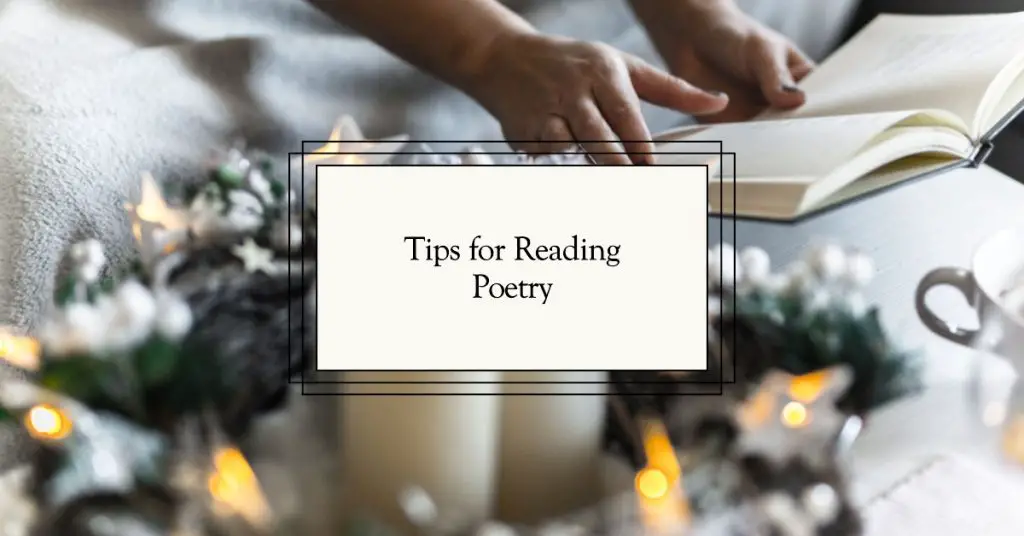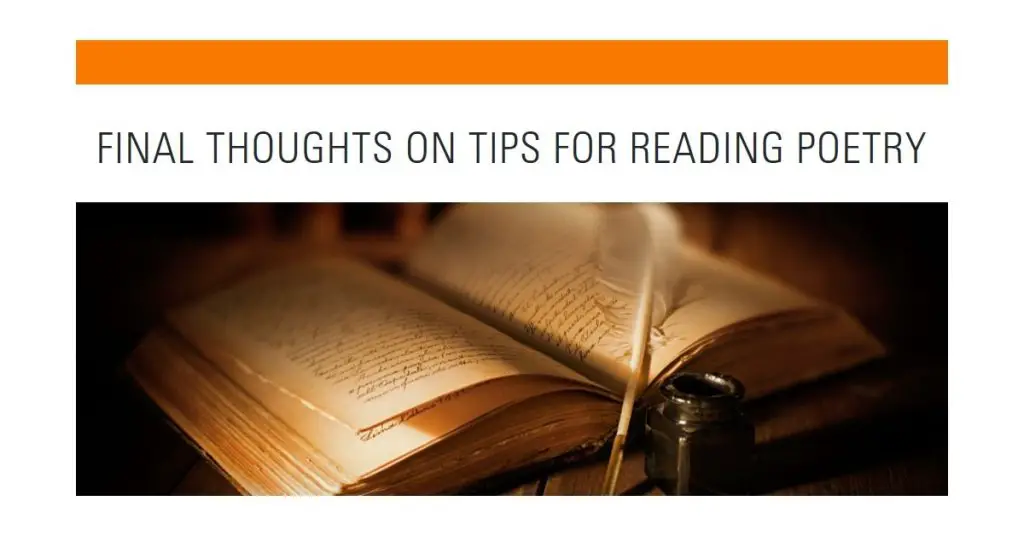tips for reading poetry

Have you ever felt intimidated by poetry?
Maybe you were forced to read it in high school and couldn’t understand it, or perhaps you’ve always been intrigued but didn’t know where to start.
Whatever your experience with poetry may be, fear not! Reading and understanding poetry can be an advantageous experience.
In this easy beginner’s guide, I’ll share eight tips for reading poetry to help demystify the genre and make it more accessible.
Whether you’re a seasoned reader or just starting, these tips will assist you in unlocking the beauty and meaning within poems.
So please grab a cup of tea, settle into your favourite chair, and dive into the world of verse together.
8 Simple But Effective Tips
Whether you’re new to reading poems or want to deepen your understanding, these tips will provide ways to engage with the text, gain insights into its meaning, and ultimately enjoy the experience of reading poetry.
So let’s dive into these eight tips for reading poetry:
1. Go In With An Open Mind.
When reading poetry, it’s essential to approach the text with an open mind.
Poetry can be complex and layered, and it’s unlikely that you’ll understand everything about a poem on your first read-through.
But don’t let that discourage you! Part of the beauty of poetry is its ability to reveal new meanings over time.
One tip for reading poetry is to take your time with each line. Read it slowly and carefully, paying attention to the words used and how they’re arranged.
Don’t worry if you don’t immediately understand what the poet is trying to say – sometimes, even experienced readers need to unpack a poem before it clicks.
Another helpful strategy is to pay attention to literary devices like metaphor and symbolism.
These tools can add layers of meaning to a poem that might take time to be evident from surface-level readings.
2. Start Small
Reading poetry can be a daunting task for anyone new to it.
The language, the structure and the themes can all seem overwhelming at first, leaving you feeling frustrated and confused.
But don’t worry! There are some simple tips that you can follow to ease your way into reading poetry without feeling overwhelmed.
One of the best tips for reading poetry is to start small. Begin with poems that are more accessible, especially if you’re new to reading poetry.
Look for poets who use clear language and simple structures that are easy to follow. This will help you get comfortable with the genre before moving on to more complex works.
Another valuable tip for reading poetry is to read it out loud. Poetry is meant to be heard as well as seen on the page.
By reading it aloud, you can better appreciate its rhythm and intonation, which will help you understand its meaning more deeply.
3. Read Like A Poet
Poetry is often described as the art of language. It’s the perfect medium for expressing complex emotions and ideas compactly and efficiently.
But reading poetry can be intimidating, especially if you’re not familiar with all the literary devices and techniques commonly used by poets.
That being said, it’s possible to learn how to read like a poet:
- One tip is to pay attention to rhyme, rhythm, and meter. Many poems use these elements to create a musical quality that enhances their meaning or emotional impact.
- Try reading the poem aloud or tapping your foot along with the rhythm to understand how they work together.
- Another technique is to look for the use of metaphor and imagery. These devices help poets convey abstract ideas by comparing them to something concrete or using vivid descriptions that stimulate our senses.
4. Read Actively
When it comes to reading poetry, the experience can be both exhilarating and intimidating. The beauty of poetry is that it can evoke different emotions from different people. Still, sometimes its complexity can make it hard to understand.
However, there are ways to read poetry actively and get the most out of every word.
The first tip for reading poetry is to annotate the poem as you go along. Underline or circle key phrases that stand out to you, and write your thoughts in the margins.
This will help you remember specific lines and phrases that struck a chord with you and allow you to reflect on what they mean.
By doing this, you will better comprehend the poem’s meaning and engage with it more personally.
Another helpful exercise while reading poetry is trying to identify literary devices such as metaphors or similes used by the poet. This will help you understand the underlying message in the poem.
5. Read Intentionally
With the right mindset and approach, one can truly appreciate the beauty of this literary form.
The key is to read intentionally, to sit with the poem and allow it to reveal its secrets slowly over time. Here are three tips for reading poetry intentionally:
- Firstly, take your time. Poetry is not meant to be rushed like a novel or news article. Instead, read slowly and deliberately, allowing each word and phrase to sink in fully before moving on.
- Secondly, pay attention to the emotions that the poem evokes in you. Does it make you feel sad or happy? Are you confused or enlightened? These feelings can give insight into what the poet was trying to convey.
- Thirdly, focus on imagery and figurative language used by the poet.
6. Read Poetry You Enjoy
One of the most essential tips for reading poetry is to read what you enjoy, not what you should read.
We risk turning ourselves off from the entire genre when we force ourselves to read poetry that doesn’t speak to us.
Instead of feeling obligated to read certain poets or styles, take some time to explore different poets and find ones that resonate with you.
Slam poetry or contemporary free verse speaks to your soul. Or traditional forms like sonnets and villanelles capture your heart.
Whatever it may be, don’t be afraid to experiment and discover new voices. Remember, there is no right or wrong way to read poetry.
7. Have Fun With Poetry
There’s a common misconception that poetry is reserved for severe and pretentious individuals who sit in their ivory towers, analyzing every word with a furrowed brow.
However, this couldn’t be further from the truth. Poetry is meant to be enjoyed and experienced by everyone!
If you’re new to reading poetry or need tips for enhancing your experience, choose a poem that speaks to you personally.
It could resonate with your current emotions or remind you of a significant moment in your life.
Take the time to read the poem slowly and carefully, paying attention to each line and its meaning.
Don’t worry about understanding everything right away – frequently, poems are intentionally written with multiple interpretations in mind.
Instead, focus on what stands out and how it makes you feel.
8. Practice, Practice, Practice
The more you read and engage with poetry, the easier it becomes to understand and appreciate the art form. Here are some tips for reading poetry:
- Firstly, don’t get discouraged if you don’t fully understand a poem on your first read. Poetry is meant to be savoured slowly and often requires multiple readings to grasp its meaning entirely.
- Secondly, try reading poems aloud, as this can help bring them to life and allow you to connect with their rhythm and flow.
- Thirdly, please pay attention to the poet’s word choices, as they often have deeper meanings beyond their literal definitions.
- Additionally, take note of any recurring themes or symbols throughout a poem or collection of poems, as these will often provide insights into what the poet is trying to convey.
Final Thoughts On Tips For Reading Poetry

Final Thoughts on Tips for Reading Poetry
In conclusion, reading poetry is not as intimidating as it may seem. By applying the eight tips discussed in this article, you can quickly begin to appreciate and understand different styles of poetry.
Remember to read slowly, ask questions, and pay attention to the imagery and emotions conveyed in each poem.
Use audio recordings and online analysis tools to enhance your understanding.
With practice and patience, you will soon enjoy poetry like never before. So pick up that book of poems you’ve been hesitant to read and give it another try.
You might find a new favourite poet or discover a deeper connection with yourself through the power of language. Happy reading!


